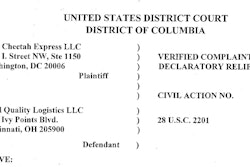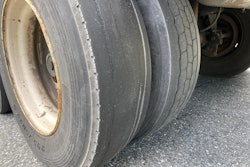Update: This article was updated on Friday, March 14 to reflect changes made to the bill.
A new bill introduced in the Arkansas state legislature, HB 1569 or the "Secure Roads and Safe Trucking Act of 2025," would ban out of state nondomiciled CDL and commercial learners permit holders from operating commercial motor vehicles and seek to impound their trucks and fine them $5,000 per violation.
Since introduction, it's undergone some changes after meeting a fair amount of opposition, including from the state's trucking association, according to some of the bill's original proponents.
Shannon Everett, a former fleet owner and cofounder of the fairly new American Truckers Union group, lobbied for the bill and said "we amended the language to reflect Mexico and Canada’s agreement" with the United States to recognize the validity of each others' issued CDLs, and "just added in the language" that requires drivers from Canada, Mexico, or any other country "to have a valid work visa."
The earlier version of the legislation stated Arkansas would not recognize Canadian-issued CDLs, if it passed. "We don’t believe Canada is sending Canadians," said Everett, who is researching the degree to which non-citizens have been able to get CDLs and operate in North America. "They have broken our trust. That still needs to be addressed, but it isn't in this bill."

The bill, introduced by two Republican state house members and one state senator, would add a requirement to Arkansas law requiring drivers working for US Domiciled Carriers to posses a domestic U.S. CDL and declaring all out of state nondomiciled or non-U.S.-issued CDLs improper for commercial operations in the state.
Under the bill, drivers on any type of visa, or those who don't speak English, caught operating within state borders would face $5,000 fines and an impound. Non-citizen drivers who cause bodily harm while operating a commercial vehicle would face a minimum of six months in prison and a Class D felony. Non-citizen drivers who cause a death would get charged with vehicular homicide and given a minimum of 10 years in jail.
Fleets in Arkansas that hire a non-citizen or non-domiciled CDL holder would face a fine of $10,000.
Overdrive reached out to the Arkansas Trucking Association but did not get a comment. The earlier version of the bill proposed to end Arkansas reciprocity for CDLs issued from Canada, potentially putting it in direct conflict with the federally regulated CDL program, which could possibly threaten the decertification of Arkansas' own CDL program, or cuts to federal funding for the state. The U.S. Congress and the federal government in general, not states, have authority over interstate commerce.
Everett lobbied for the bill with state lawmakers in his native Arkansas, and said he felt compelled to advocate for victims of crashes and the trucking industry.
"There was a wreck that happened in Colorado where the driver had been deported 16 times," said Everett. The crash killed 64-year old Scott Miller, who was on his way home from getting groceries. "There wasn't a strong voice for the American truck driver on this issue. I felt a strong tug from the Lord" to begin advocating for safer highways and better regulations in trucking. "We’re talking about safety and coming at it from the perspective of making our roads safer, and I've observed a clear lapse in laws and regulations that were not voted on" he added.
For example, the federal rules that individual states agree to reciprocity among other states included a clause about English proficiency, Everett noted. In 2016, FMCSA issued a memo telling law enforcement not to enforce the English-language proficiency requirement in its regulations so long as the driver could get through an inspection and communicate to the understanding of the officer.
"FMCSA ordered everyone to stand down," said Everett. "The state of Arkansas didn’t get any say in that."
In the same vein, Everett says "when our state and all the states reviewed reciprocity," U.S. border policy was significantly different. "Extending reciprocity to other states" with the expectation that they only issue CDLs to citizens hasn't worked out, since "the system is broken," he said.
States can issue CDLs to non-citizens, sometimes requiring only an Employment Authorization Document, which allows someone to work for a specific time period within the U.S. In the state of Vermont, for example, non-domiciled CDL or CLP applicants don't have to prove where they live.
According to Everett, this class of drivers has an increasingly large footprint in the industry. Overdrive readers, similarly, have flagged foreign drivers as a growing trend and potentially an area for the Department of Government Efficiency to look into.
[Related: Complete Overdrive's survey on DOGE here]
In 25 years in the transportation industry, "I never hired a non-domicled CDL" holder, "and never had one presented to me. Most of my friends will say the same," Everett said. Now, he contended, loose immigration rules in places like Oregon and reciprocity with Canada have opened the door to non-domiciled drivers in a major way.
HB 1569 would seek to put an end to recognition of many such CDL holders operating in Arkansas or being employed by firms operating there.












